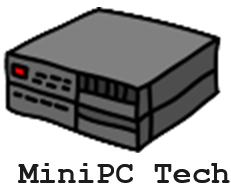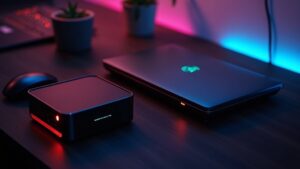When choosing between a mini PC vs gaming laptop, it really comes down to your needs. If you value portability and want to game anywhere without extra gear, a gaming laptop’s integrated features are ideal. However, if you’re looking for performance, upgradeability, and budget-friendliness, a mini PC might be the better choice. Mini PCs typically outperform laptops in benchmarks and allow for easier upgrades. Consider your gaming habits and whether you prioritize power or mobility. There’s a lot to weigh, and exploring your options will help you make the best choice for your lifestyle.
Key Takeaways
- Mini PCs offer extensive upgradeability and lower entry prices, making them ideal for budget-conscious users seeking flexibility.
- Gaming laptops provide superior portability and all-in-one features, perfect for gamers who want to play anywhere without extra peripherals.
- Performance-wise, mini PCs often excel in benchmarks, though high-end gaming laptops deliver exceptional gaming experiences with dedicated GPUs.
- If you prioritize mobility and ease of setup, a gaming laptop is the better choice; mini PCs are better suited for stationary use.
- Assess your gaming habits and preferences, as well as budget and portability needs, to decide the best option for you.
Mini PC Overview
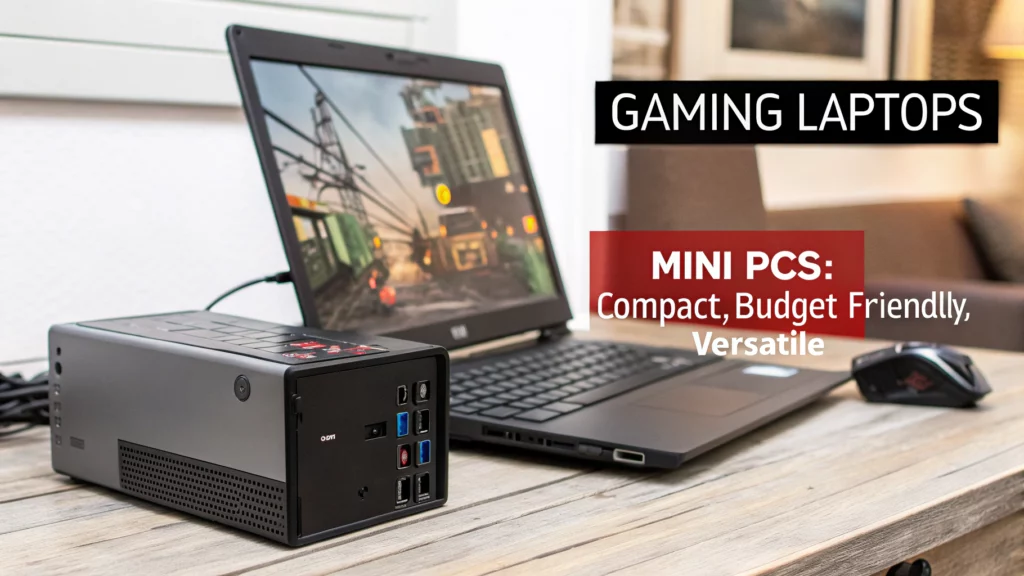
Mini PCs are an innovative solution for those seeking powerful computing in a compact form. These devices boast a smaller form factor while delivering impressive performance, making them perfect for users who prioritize portable power. You’ll find various designs, including mini towers, slim PCs, and ultra-portables, each catering to different needs. Unlike gaming laptops, Mini PCs require external peripherals like monitors and keyboards, which can be a drawback for some. However, they offer significant advantages in upgradeability, allowing you to access and replace internal components with ease. Additionally, their energy efficiency enables users to save on power consumption over time. Many Mini PCs utilize desktop-grade hardware, ensuring better performance and cooling than laptops in similar price ranges. Cooling systems are essential for maintaining optimal performance, especially during demanding tasks. If you value customization and efficiency, a Mini PC might just be your ideal choice.
Gaming Laptop Overview
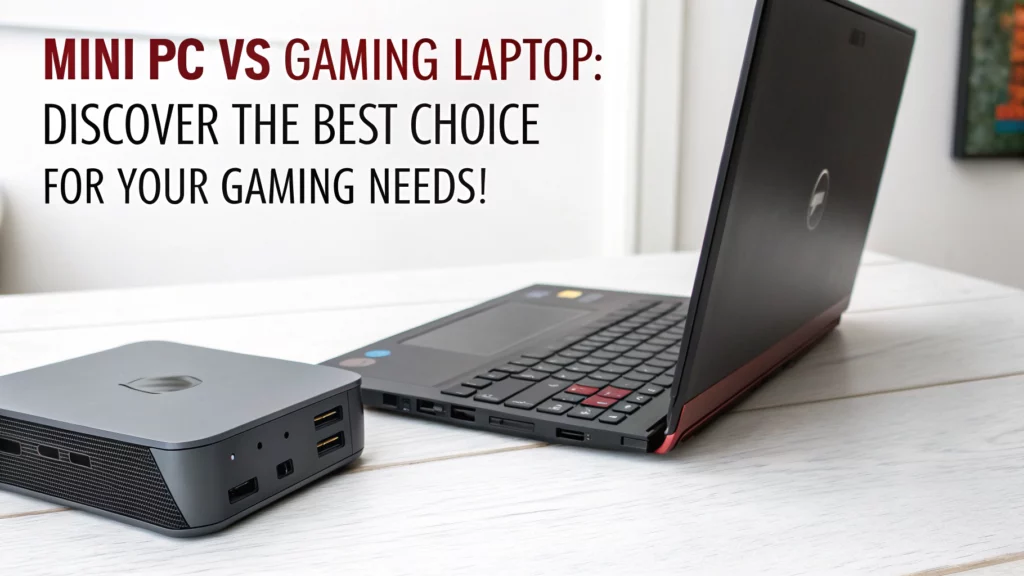
When it comes to gaming on the go, gaming laptops are a top choice for many players. They combine powerful CPUs and dedicated GPUs, enabling you to play games with stunning graphics and smooth performance. With refresh rates of 120Hz or above, these machines enhance your gaming experience, making every frame count.
| Feature | Description |
|---|---|
| RAM | Minimum 8GB, 16GB or 32GB ideal |
| GPU | Dedicated GPU for better performance |
| Portability | Compact design for gaming anywhere |
While gaming laptops excel in performance, they’re less flexible for upgrades compared to mini PCs. If you want the best gaming experience while traveling, a gaming laptop might be your ideal solution.
Mini PC vs Gaming Laptop: A Performance Comparison
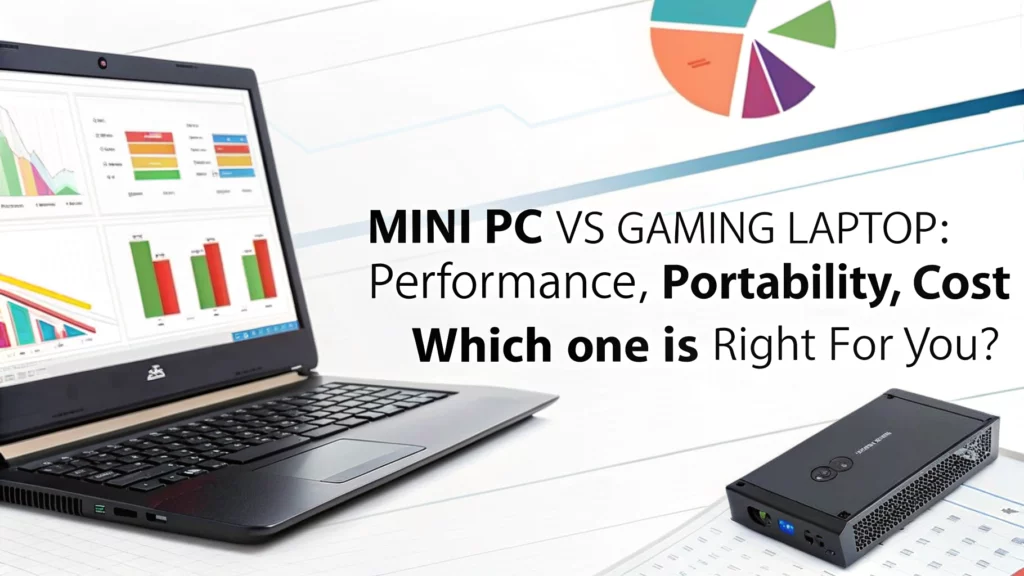
Performance can make or break your gaming experience, and understanding the differences between mini PCs and gaming laptops is essential.
Generally, mini PCs outperform laptops in benchmarking tests due to superior cooling systems and the ability to house more powerful components. High-end mini PCs deliver impressive computing power, but they can struggle under high thermal loads. Advanced cooling systems are essential to maintain performance during heavy usage, which can be crucial for gamers.
While mini PCs are great for casual gaming, they often lack the dedicated GPUs found in gaming laptops, which excel in handling graphic-intensive applications and multitasking.
Although mini PCs offer a compact design, their limited upgrade options can be a drawback.
In contrast, gaming laptops provide robust processing capabilities and greater flexibility, making them a solid choice for serious gamers seeking performance. Furthermore, mini PCs like the Intel NUC 12 can be equipped with advanced GPUs for enhanced gaming experiences.
Portability Considerations
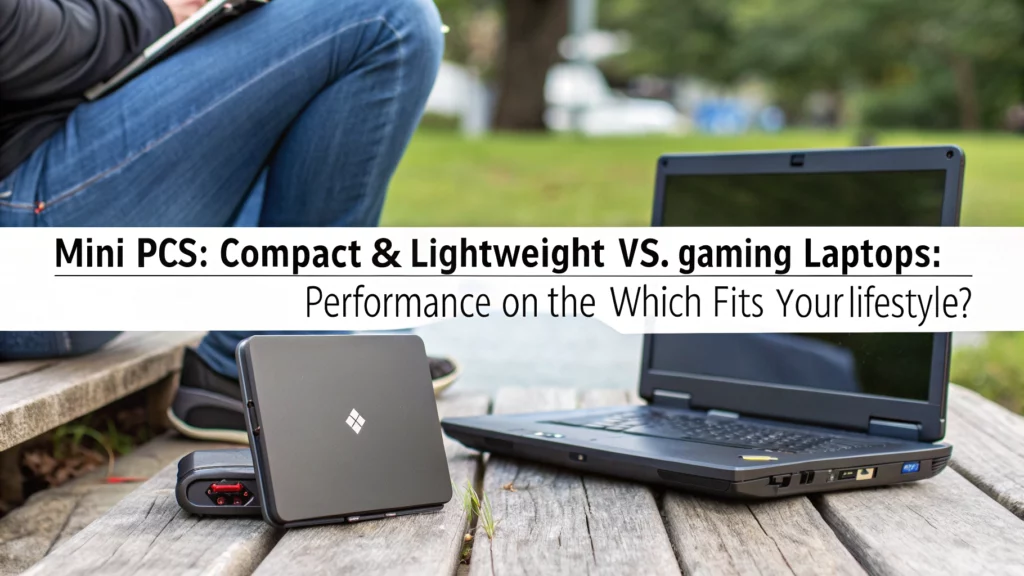
For those who prioritize portability, gaming laptops shine as the clear winner.
These all-in-one systems are designed for mobility, allowing you to game anywhere without the hassle of extra peripherals. Unlike mini PCs, which require additional components like monitors and keyboards, gaming laptops offer a streamlined experience that’s perfect for on-the-go gaming.
While mini PCs can fit snugly into small spaces, their bulkiness and tangled cables can complicate public use.
If you’re looking for a device that’s easy to transport and set up quickly, a gaming laptop is your best bet. It combines performance and convenience, ensuring you can enjoy high-quality gaming wherever you’re without worrying about additional equipment. Additionally, the advanced M4 chip in devices like the Mac Mini 2024 showcases how compact systems can also deliver impressive performance, appealing to users seeking a balance between portability and power.
Upgradeability and Maintenance
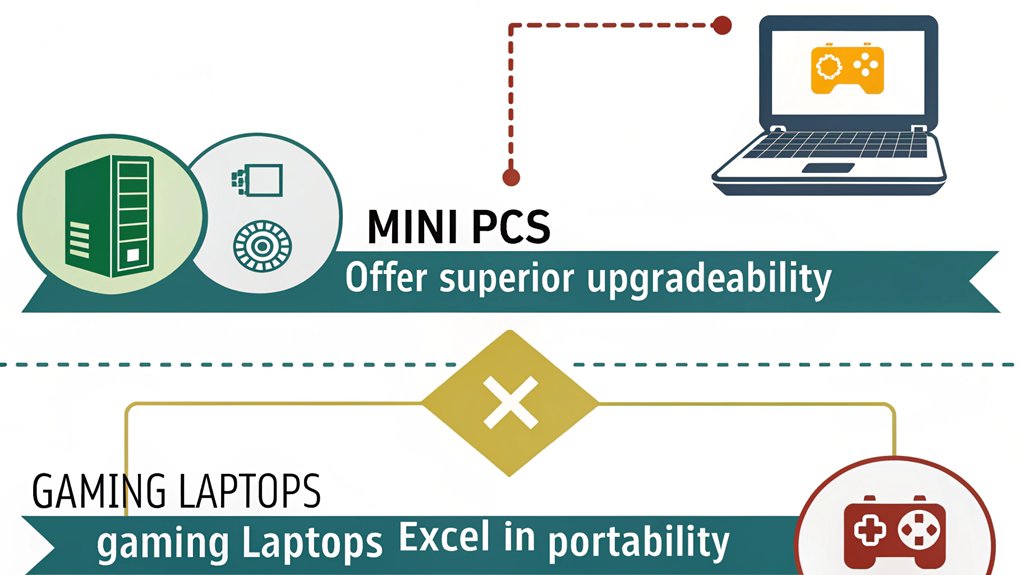
One significant advantage of mini PCs is their remarkable upgradeability and maintenance options. Unlike gaming laptops, which often have limitations due to soldered RAM, mini PCs allow you to enhance your system over time. This modular design not only simplifies maintenance but also guarantees your setup remains cutting-edge. Additionally, Linux distributions can run efficiently on less powerful hardware, providing further options for users looking to optimize performance.
Here are some key benefits:
- User-accessible slots for M.2 and SATA drives
- Easy RAM module upgrades
- Internal upgrades without replacing the whole system
- Straightforward component replacements
- Enhanced longevity and performance improvements
Additionally, the ability to assess usage needs before upgrades ensures that you invest in the most impactful enhancements for your gaming experience. With mini PCs, you can maximize your investment and adapt to evolving gaming demands, guaranteeing your system stays relevant and powerful without the hassle of a complete overhaul like you might face with a gaming laptop.
Mini PC vs Gaming Laptop: A Price and Value Analysis
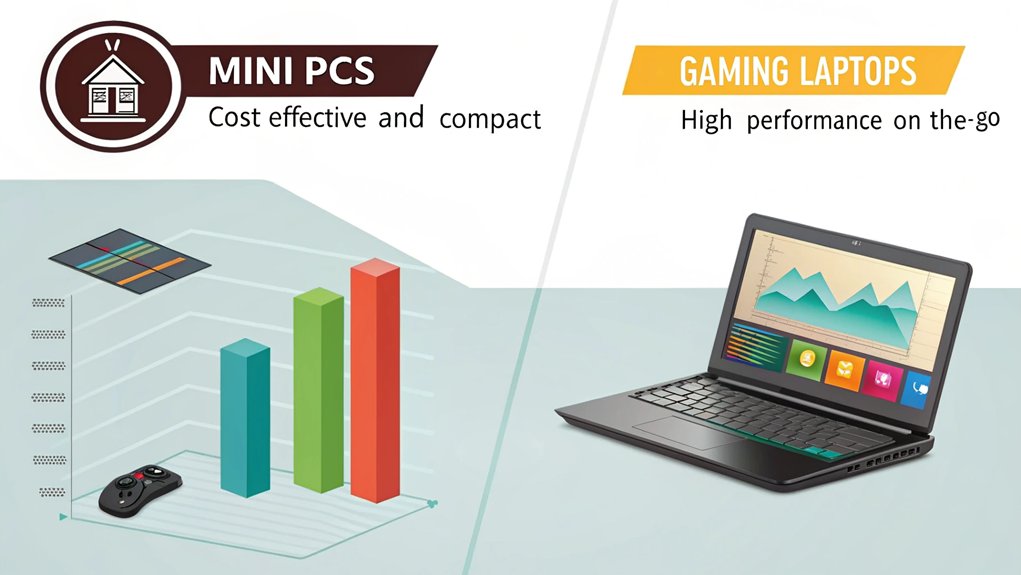
When weighing the costs of mini PCs against gaming laptops, you’ll find that mini PCs usually come with a lower price tag, making them appealing for budget-conscious consumers. Entry-level mini PCs can be snagged for under $200, while affordable gaming laptops kick off around $1000, revealing a significant price disparity.
While mini PCs offer incredible value, remember that they may require additional investments in external peripherals like monitors and keyboards. This can increase the overall cost of ownership. Additionally, many mini PCs support high-resolution displays, allowing you to enjoy a great visual experience without the hefty price of a gaming laptop. Furthermore, these devices often prioritize energy efficiency, making them a smart choice for extended use in home theater setups.
On the flip side, gaming laptops provide an all-in-one solution, but their higher price often reflects built-in convenience rather than superior performance. Ultimately, understanding your needs will help you assess which option delivers the best value for your gaming aspirations.
Ideal Use Cases
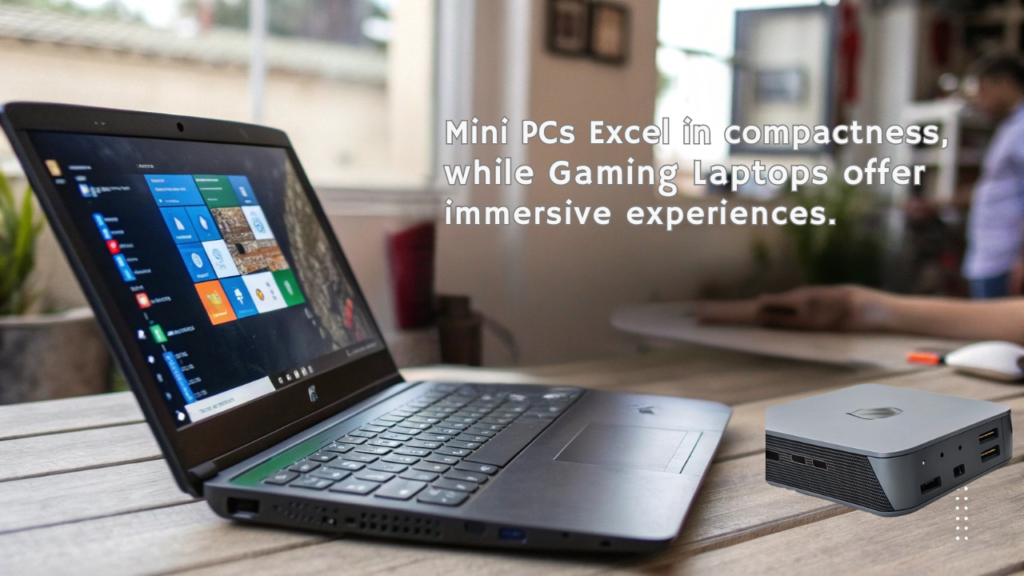
In tight spaces like dorms or small apartments, mini PCs shine as practical solutions for casual gaming and media consumption. Their small form factor makes them perfect for various ideal use cases, especially when you don’t need the high-end performance of a gaming laptop.
Consider these scenarios:
- Casual gaming and streaming
- Retro gaming setups
- LAN parties with manageable peripherals
- Stationary use in limited spaces
- Durable solutions without battery concerns
If you want to enjoy gaming without sacrificing space, a mini PC could be your answer. Additionally, mini PCs consume significantly less power than traditional desktops, offering energy efficiency benefits that can lead to cost savings over time.
While gaming laptops offer portability, those seeking convenience in stationary environments might find mini PCs more appealing, combining power and practicality in one compact device.
Final Thoughts on Choices
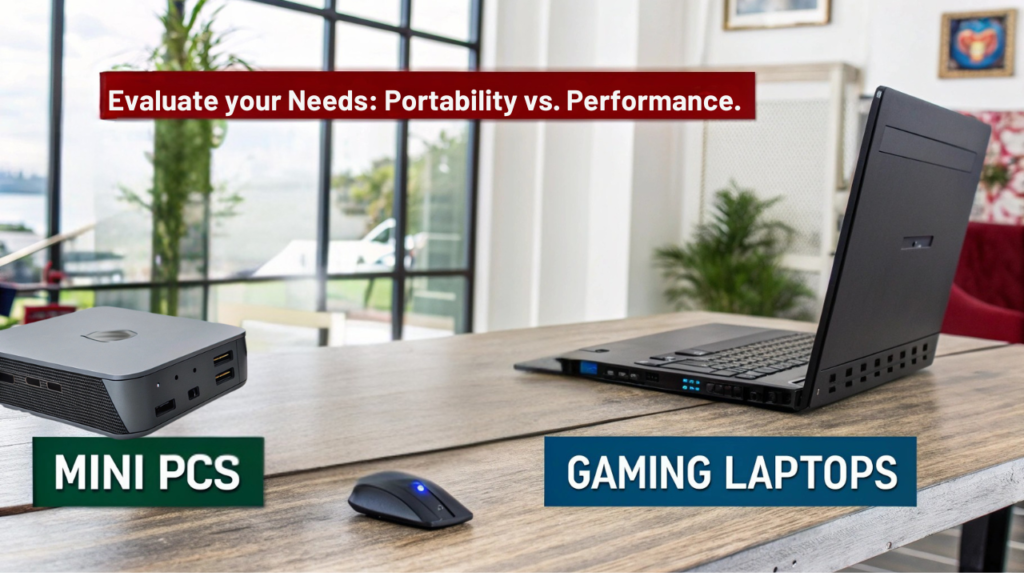
Choosing between a mini PC and a gaming laptop ultimately hinges on your personal preferences and gaming habits. If you’re aiming for budget-friendly options and don’t mind using external peripherals, it might be best to go with a mini PC. On the other hand, if you crave powerful performance and portability, a gaming laptop could be your ideal choice.
| Feature | Mini PC | Gaming Laptop |
|---|---|---|
| Cost | Generally lower | Typically higher |
| Upgradeability | Extensive options | Limited upgrades |
| Portability | Stationary use | On-the-go convenience |
Ultimately, weigh your need for additional performance against the compactness of a mini PC to find the perfect fit for your gaming lifestyle.
Frequently Asked Questions
Are Mini PCS Better Than Laptops for Gaming?
When considering gaming, mini PCs can outperform laptops in performance and upgradeability, thanks to their powerful components and cooling systems. However, if you need portability, laptops offer unmatched convenience for gaming on the go.
Is a Mini Laptop Better Than a Laptop?
Imagine a sleek mini laptop fitting snugly in your bag, ready for any adventure. You’ll appreciate its lightweight design and convenience, but don’t forget—performance may lag behind traditional laptops when tackling demanding tasks.
Is Getting a Gaming Laptop Better Than a PC?
When you consider a gaming laptop over a PC, you’re prioritizing portability and convenience. It packs performance into a compact design, making it easier for you to game anywhere without the hassle of separate peripherals.
What Is the Downside to a Mini PC?
Isn’t it frustrating when your device can’t keep up? Mini PCs often struggle with performance and upgradeability. They can’t handle high-end gaming well, leaving you wanting more power and flexibility for your gaming experience.
Conclusion
In the end, choosing between a mini PC and a gaming laptop boils down to your lifestyle and gaming habits. If you’re a student who loves gaming on the go, a gaming laptop might be your best bet. However, if you enjoy a sleek setup for casual gaming and streaming at home, a mini PC could be ideal. Imagine seamlessly shifting from work to gaming with a compact mini PC tucked beside your monitor—it’s all about what fits your life!

I am a retired software engineer with experience in a multitude of areas including managing AWS and VMWare development environments. I bought a relative a mini-PC a year ago and have become passionate about the technology and its potential to change how we deploy software.
